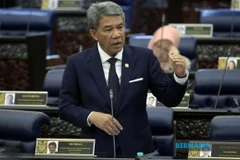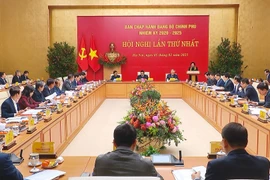 British Foreign Secretary Boris Johnson, left, shakes hands with Thai Prime Minister Prayuth Chan-Ocha during their meeting at the Government House, in Bangkok, Thailand, Monday, Feb. 12, 2018. (Narong Sangnak/Pool Photo via AP)
British Foreign Secretary Boris Johnson, left, shakes hands with Thai Prime Minister Prayuth Chan-Ocha during their meeting at the Government House, in Bangkok, Thailand, Monday, Feb. 12, 2018. (Narong Sangnak/Pool Photo via AP) Bangkok (VNA) – BritishForeign Secretary Boris Johnson met Thai Prime Minister Prayuth Chan-ocha andother officials in Bangkok on February 12, discussing neighbouring Myanmar's ethnicRohingya issue and Thailand’s plan for elections.
A statement from Britain's Foreign& Commonwealth Office said their discussions also mentioned"cooperation on education, the digital economy, science and innovation,financial technology, and trade and investment, as well as further co-operationto tackle the illegal wildlife trade."
The statement also quoted Johnson as saying"I look forward to further strengthening the UK's relationship withThailand in the future."
Johnson is in Thailand after visitingBangladesh, where he met Rohingya refugees, and Myanmar, where he held talks onthe Rohingya situation with the country's leader Aung San Suu Kyi.
Johnson's visit to Thailand cameafter a visit on February 9 by Italy's foreign minister, and will be followedby the French deputy foreign minister on February 13.
Thai Foreign Ministry spokeswomanBusadee Santipitak said the trips are a sign of improved relations betweenThailand and European nations following the EU's easing of sanctions on thecountry in December 2017.-VNA

























